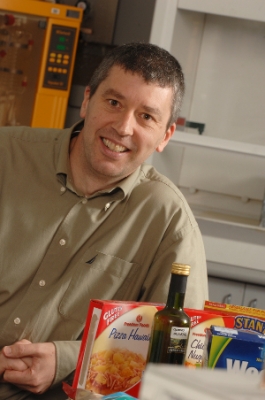Taste function not influenced by chemotherapy
Research news
New research from Deakin University challenges the commonly-held belief that a patient’s sense of taste is affected by chemotherapy treatment.
The research involved a systematic review of 31 research papers involving interviews with more than 5000 cancer patients who were undergoing chemotherapy treatment.
It looked at whether and how chemotherapy influences sensitivity to the five taste qualities of sweetness, sourness, umami (savoury), saltiness and bitterness; the intensity of the five taste qualities; the like or dislike of food and appetite.
Lead Researcher, Associate Professor Russell Keast from the Centre for Physical Activity and Nutrition within Deakin’s School of Exercise and Nutrition Science, said that it was widely believed that a patient’s taste function is altered during periods of chemotherapy treatment.
“It is important to distinguish taste, which relates purely to the perception of the five taste qualities, from flavour, which involves other sensory input, when evaluating the influence of chemotherapy as this will impact future interventions for patients,” Associate Professor Keast said.
The research review found that there was little consistent evidence of a reduction in sensitivity to sweetness, sourness or saltiness although, in two studies, there was a trend of decreased sensitivity to bitter taste for up to 18 weeks after the start of chemotherapy treatment.
The taste quality of umami - or savoury taste - was not included in any of the studies included in the research.
With regard to taste intensity, the research found little evidence of the influence of chemotherapy on perceived intensity of sweetness, saltiness or bitterness but there was a trend towards greater intensity of sour taste after chemotherapy.
The combined results of studies into patients’ liking of food during chemotherapy treatment found that there was a general trend of decreased liking of foods after chemotherapy commenced.
“The food and beverage groups most commonly the target of reduced liking of food included caffeinated foods and drinks, red meat and citrus fruit or juices,” Associate Professor Keast said.
Two of the three studies examined, however, showed a recovery in liking of food two to four months after the commencement of chemotherapy.
Although between six and 69 percent of patients receiving chemotherapy complain of a loss of appetite during treatment, the studies found no consistent pattern of the impact of chemotherapy on appetite.
“What was very clear in the papers reviewed was that appetite, or the motivation to eat and drink, decreases after chemotherapy commences and food enjoyment also decreases,” he said.
The authors therefore hypothesised that changes occur in relation to food enjoyment and appetite independently of taste. What this means is that, even though food might taste the same during treatment, this taste is no longer pleasant.
Chemotherapy is usually received by patients in cycles every two to three weeks.
Clinical research with patients who have experienced what they describe as taste changes reveals that these symptoms are worse in the first week after chemotherapy is received and then gradually improve until chemotherapy is received again.
Associate Professor Keast said there was a need for further research which consistently defined and used uniform methodologies to test taste perception, food liking and appetite.
“There is currently insufficient published research to suggest that taste is influenced by chemotherapy, although there is evidence that food liking and appetite are influenced,” he said.
“Ideally, clinicians should be able to not only forewarn patients of specific problems related to taste or the pleasure derived from food during treatment, but should be able to offer appropriate strategies to manage these,” he said.
The sensory team at Deakin University is working with clinicians and patients at Peter MacCallum Cancer Centre and Eastern Health to measure taste function in breast cancer patients receiving chemotherapy at 3 time points during their chemotherapy cycle. In this way, we might be able to see problems with taste that weren't detected in other studies which measured taste once symptoms had resolved.
The findings are published in Cancer Treatment Reviews 38 (2012).
Share this story
 It is important to distinguish taste, which relates purely to the perception of the five taste qualities, from flavour, which involves other sensory input, when evaluating the influence of chemotherapy as this will impact future interventions for patients, says Associate Professor Russell Keast.
It is important to distinguish taste, which relates purely to the perception of the five taste qualities, from flavour, which involves other sensory input, when evaluating the influence of chemotherapy as this will impact future interventions for patients, says Associate Professor Russell Keast.
